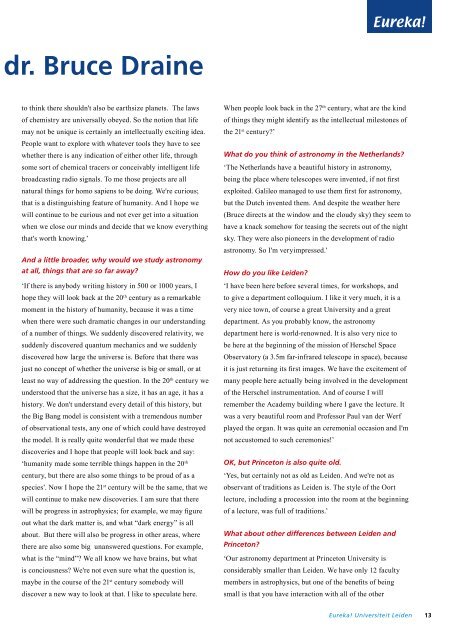De sleutel in een bewijs
De sleutel in een bewijs
De sleutel in een bewijs
You also want an ePaper? Increase the reach of your titles
YUMPU automatically turns print PDFs into web optimized ePapers that Google loves.
dr. Bruce Dra<strong>in</strong>e<br />
to th<strong>in</strong>k there shouldn't also be earthsize planets. The laws<br />
of chemistry are universally obeyed. So the notion that life<br />
may not be unique is certa<strong>in</strong>ly an <strong>in</strong>tellectually excit<strong>in</strong>g idea.<br />
People want to explore with whatever tools they have to see<br />
whether there is any <strong>in</strong>dication of either other life, through<br />
some sort of chemical tracers or conceivably <strong>in</strong>telligent life<br />
broadcast<strong>in</strong>g radio signals. To me those projects are all<br />
natural th<strong>in</strong>gs for homo sapiens to be do<strong>in</strong>g. We're curious;<br />
that is a dist<strong>in</strong>guish<strong>in</strong>g feature of humanity. And I hope we<br />
will cont<strong>in</strong>ue to be curious and not ever get <strong>in</strong>to a situation<br />
when we close our m<strong>in</strong>ds and decide that we know everyth<strong>in</strong>g<br />
that's worth know<strong>in</strong>g.’<br />
And a little broader, why would we study astronomy<br />
at all, th<strong>in</strong>gs that are so far away?<br />
‘If there is anybody writ<strong>in</strong>g history <strong>in</strong> 500 or 1000 years, I<br />
hope they will look back at the 20th century as a remarkable<br />
moment <strong>in</strong> the history of humanity, because it was a time<br />
when there were such dramatic changes <strong>in</strong> our understand<strong>in</strong>g<br />
of a number of th<strong>in</strong>gs. We suddenly discovered relativity, we<br />
suddenly discovered quantum mechanics and we suddenly<br />
discovered how large the universe is. Before that there was<br />
just no concept of whether the universe is big or small, or at<br />
least no way of address<strong>in</strong>g the question. In the 20th century we<br />
understood that the universe has a size, it has an age, it has a<br />
history. We don't understand every detail of this history, but<br />
the Big Bang model is consistent with a tremendous number<br />
of observational tests, any one of which could have destroyed<br />
the model. It is really quite wonderful that we made these<br />
discoveries and I hope that people will look back and say:<br />
‘humanity made some terrible th<strong>in</strong>gs happen <strong>in</strong> the 20th century, but there are also some th<strong>in</strong>gs to be proud of as a<br />
species’. Now I hope the 21st century will be the same, that we<br />
will cont<strong>in</strong>ue to make new discoveries. I am sure that there<br />
will be progress <strong>in</strong> astrophysics; for example, we may figure<br />
out what the dark matter is, and what “dark energy” is all<br />
about. But there will also be progress <strong>in</strong> other areas, where<br />
there are also some big unanswered questions. For example,<br />
what is the “m<strong>in</strong>d”? We all know we have bra<strong>in</strong>s, but what<br />
is conciousness? We're not even sure what the question is,<br />
maybe <strong>in</strong> the course of the 21st century somebody will<br />
discover a new way to look at that. I like to speculate here.<br />
Eureka!<br />
When people look back <strong>in</strong> the 27th century, what are the k<strong>in</strong>d<br />
of th<strong>in</strong>gs they might identify as the <strong>in</strong>tellectual milestones of<br />
the 21st century?’<br />
What do you th<strong>in</strong>k of astronomy <strong>in</strong> the Netherlands?<br />
‘The Netherlands have a beautiful history <strong>in</strong> astronomy,<br />
be<strong>in</strong>g the place where telescopes were <strong>in</strong>vented, if not first<br />
exploited. Galileo managed to use them first for astronomy,<br />
but the Dutch <strong>in</strong>vented them. And despite the weather here<br />
(Bruce directs at the w<strong>in</strong>dow and the cloudy sky) they seem to<br />
have a knack somehow for teas<strong>in</strong>g the secrets out of the night<br />
sky. They were also pioneers <strong>in</strong> the development of radio<br />
astronomy. So I'm veryimpressed.’<br />
How do you like Leiden?<br />
‘I have b<strong>een</strong> here before several times, for workshops, and<br />
to give a department colloquium. I like it very much, it is a<br />
very nice town, of course a great University and a great<br />
department. As you probably know, the astronomy<br />
department here is world-renowned. It is also very nice to<br />
be here at the beg<strong>in</strong>n<strong>in</strong>g of the mission of Herschel Space<br />
Observatory (a 3.5m far-<strong>in</strong>frared telescope <strong>in</strong> space), because<br />
it is just return<strong>in</strong>g its first images. We have the excitement of<br />
many people here actually be<strong>in</strong>g <strong>in</strong>volved <strong>in</strong> the development<br />
of the Herschel <strong>in</strong>strumentation. And of course I will<br />
remember the Academy build<strong>in</strong>g where I gave the lecture. It<br />
was a very beautiful room and Professor Paul van der Werf<br />
played the organ. It was quite an ceremonial occasion and I'm<br />
not accustomed to such ceremonies!’<br />
OK, but Pr<strong>in</strong>ceton is also quite old.<br />
‘Yes, but certa<strong>in</strong>ly not as old as Leiden. And we're not as<br />
observant of traditions as Leiden is. The style of the Oort<br />
lecture, <strong>in</strong>clud<strong>in</strong>g a procession <strong>in</strong>to the room at the beg<strong>in</strong>n<strong>in</strong>g<br />
of a lecture, was full of traditions.’<br />
What about other differences betw<strong>een</strong> Leiden and<br />
Pr<strong>in</strong>ceton?<br />
‘Our astronomy department at Pr<strong>in</strong>ceton University is<br />
considerably smaller than Leiden. We have only 12 faculty<br />
members <strong>in</strong> astrophysics, but one of the benefits of be<strong>in</strong>g<br />
small is that you have <strong>in</strong>teraction with all of the other<br />
Eureka! Universiteit Leiden 13


